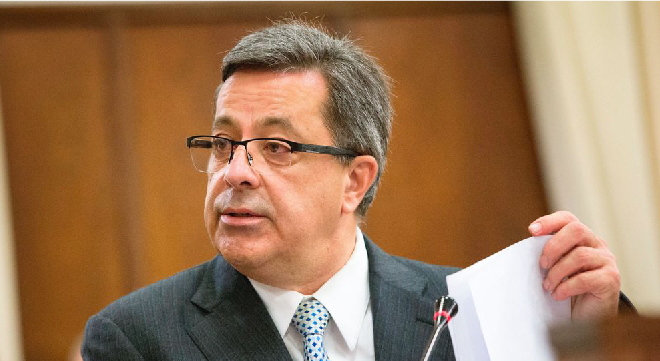The Financial Services Tribunal has ordered the FSCA to come up with an “appropriate” administrative penalty on Markus Jooste after it set aside the fine of nearly R162 million the regulator imposed on the former Steinhoff chief executive last year for insider trading.
The tribunal also set aside the fine of nearly R116m imposed on Oscan Investment Enterprises, which was owned by Jooste’s friend, the late Ockert Oosthuizen. Oscan owned 770 000 shares in Steinhoff.
The tribunal found that although Jooste had sent SMSes to four people encouraging them to sell their shares in Steinhoff, the content of the messages did not convey specific or precise insider information.
The FSCA found that, on the morning of 30 November 2017, Jooste sent SMSes to Oosthuizen, Dr Gerhardus Burger, Marthinus Swiegelaar (Jooste’s chauffeur) and Jaap du Toit, advising them to sell their Steinhoff shares immediately. Three of them, but not Du Toit, sold their shares.
Steinhoff’s share price started to collapse from 4 December, falling from R50.25 to R4.65 on 29 December – more than 91% down on its closing price on 1 December.
Burger was fined R3m and Swiegelaar R18 328, but neither applied for reconsideration.
The FSCA found that Jooste had contravened the Financial Markets Act (FMA) in two respects:
- Section 78(4)(a): “An insider who knows that he or she has inside information and who discloses inside information to another person commits an offence.”
- Section 78(5): “An insider who knows that he or she has inside information and who encourages or causes another person to deal or discourages or stops another person from dealing in the securities listed on a regulated market or in derivative instruments related to such securities, to which the inside information relates or which are likely to be affected by it, commits an offence.”
The FSCA found that Oscan contravened section 78(1)(a): “An insider who knows that he or she has inside information and who deals, directly or indirectly or through an agent for his or her own account, in the securities listed on a regulated market or in derivative instruments related to such securities, to which the inside information relates or which are likely to be affected by it, commits an offence.”
FSCA conflated sections of the Act
The tribunal agreed that Jooste had contravened section 78(5) with respect to the messages he sent to Oosthuizen, Burger and Du Toit, but not Swiegelaar.
It accepted the FSCA’s finding that, on 30 November 2017, Jooste knew more about Steinhoff’s financial situation than the market did. But, it said, none of this information was conveyed by the messages.
“The messages were vague, general and indefinite, and not precise or specific.”
The tribunal said the FSCA’s investigators stated in their report that “it looks like very little or even vague information that Mr Jooste provided in the warning SMS” but added it “was unpublished and unknown news in the market”. They had thereby fallen into “the mental trap” of conflating the requirements of section 78(4)(a) with those of section 78(5).
There was a tendency incorrectly to assume that if information has a material effect on a share’s price, it follows that the information was specific or precise, the tribunal said.
The FSCA had done what the judgment in the case of Zietsman and Another v Directorate of Market Abuse and Another (2016) held it could not do, namely, to rely on a process of deduction.
“The specific information had to be capable of being pointed to and identified and had to be capable of being expressed unequivocally.”
The tribunal accordingly found that Jooste did not contravene section 78(4)(a) and Ocsan did not contravene section 78(1) or (2).
Penalty must be appropriate
In directing the FSCA to reconsider the penalty imposed on Jooste, the tribunal took issue with a statement attributed to the FSCA’s divisional executive for investigations and enforcement, Brandon Topham, before the regulator announced its decision. Topham allegedly said the penalty would likely be more than R53m.
“Such a statement is not only inappropriate, but it may also lead to a perception of bias that may affect the whole proceedings.”
The tribunal said prescribed maximum penalties do not set a benchmark, and a penalty must be balanced, proportionate and fair.
It ordered the FSCA to determine “an appropriate” penalty for Jooste’s contravention of section 78(5) of the FMA as set out in its judgment.




The Tribunal have stuck rigidly to the letter of the Law, whereas the FSCA appear to have also considered the Spirit/Intent of the Law – more appropriate in the light of the damage done to our Market, reputation, and Economy by Jooste’s embezlement.
A pity we will not see a flood of civil actions by persons whose investments were severely damaged by his schemes!